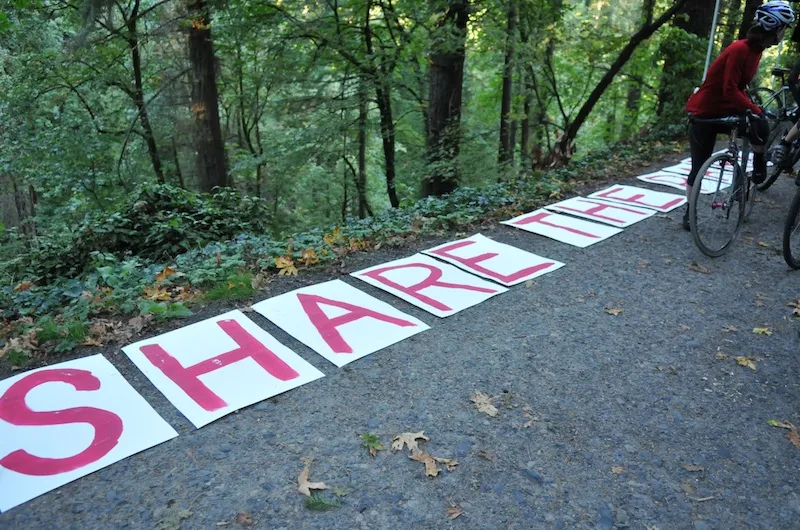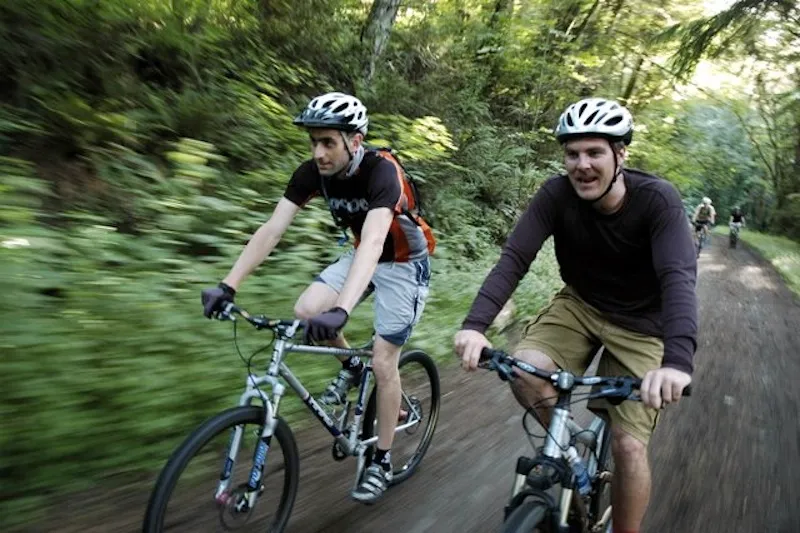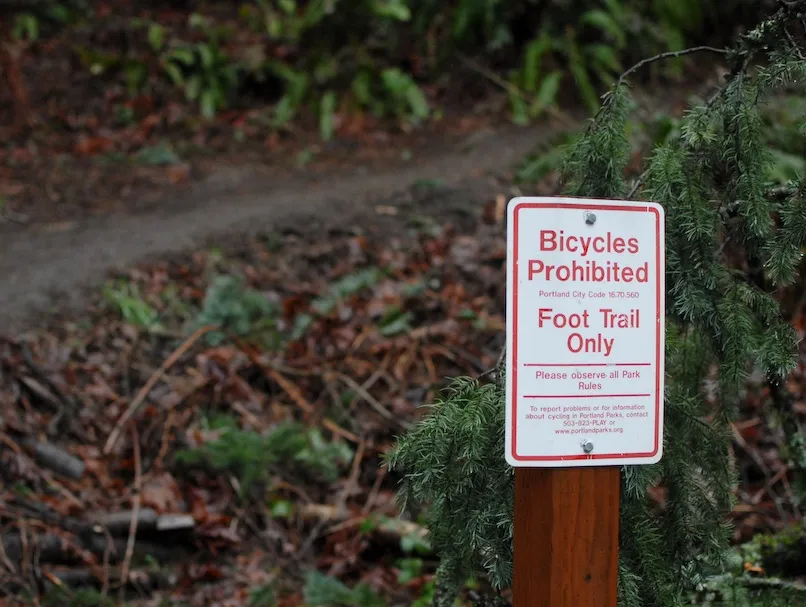Portland, Oregon holds the League of American Bicyclists' highest designation for cycle friendliness – platinum – but some local mountain bikers believe this is undeserved due to a lack of singletrack riding opportunities.
“There’s this notion that mountain biking is still new or untested or untried; the people that we’re dealing with have no outward vision,” says local mountain bike advocate Chris DiStefano. “They [Portland city government] can’t see the success that Boulder [Colorado] is having or New York is having or Zurich [Switzerland] is having [with bikes] and an environmental position too.”
Portland has no mountain bike trails and DiStefano says the nearest singletrack is at least an hour's drive away. Along with the Northwest Trail Alliance (NWTA) – the area's International Mountain Biking Association (IMBA) affiliated club – he hopes to rectify this situation. However, they don’t feel like they’re getting the co-operation they deserve from the city’s parks and recreation department.
In the summer of 2009, Portland's newly appointed commissioner of parks and recreation, Nick Fish, listened to the bicycle community’s case and pulled together the Forest Park Single Track Advisory Committee. This was made up of 26 experts, ranging from biologists to bikers and representatives for just about every group in between. They were tasked with developing a singletrack trail management plan for Forest Park, a 5,157-acre parcel of land two miles from the city center.

The Northwest Trail Alliance rallies at Forest Park
Forest Park has 70 miles of trails, 30 of which are open to bikes. However, only a small fraction of these are singletrack; most are unimproved roads and fire lanes. Forest Park is also a hot button for different groups in the city, from both environmental and recreational standpoints. It’s described by the parks department as the “most prized and well loved in all of Portland".
DiStefano and Tom Archer, president of the NWTA, say Commissioner Fish made a specific promise to provide new singletrack trail riding opportunities in Forest Park by the summer of 2010, but this is something the parks department disputes. “That is a miscommunication,” says policy co-ordinator Emily Hicks.
“We were looking for low hanging fruit and wanting to do something as soon as possible, and we're working with Tom to get the [mountain bike] skills parks in and we've expanded some access in the Powell Butte natural area, but I don’t remember [Fish] specifically saying that we were going to build something in 2010. I know he said 'as soon as possible' and that the committee was to provide its recommendations by 2010, which did happen."
Fish did promise to make changes in an interview with BikePortland.org in February 2009. “I... believe there are things we can consider that don't require system-wide changes to make more singletrack trails happen," he said. "My interest isn't in studying this to death, it's seeing what we can actually do. I assume everybody comes to the table in the good faith. I'm committed to finding ways to significantly expand our current inventory of singletrack trails."
The Commissioner didn't expressly mention Forest Park in the interview, but Jonathan Maus, editor and publisher of BikePortland.org, told us: “It was clear from his talks that he knows full well that [Forest Park] is why people came to the table." However, the summer of 2010 passed with no new off-road riding opportunities in Forest Park and the Single Track Advisory Committee was disbanded after completing its original purpose.
At about the same time the committee gave its recommendations to the parks department, a renegade trail was discovered within Forest Park, which added fuel to the fire of those arguing against further development of the area. “We [cyclists on the advisory committee] got blamed for it,” says DiStefano. “If someone robs a bank in high-tops, do you blame everyone who plays basketball? I've no idea who built that trail just because I’m part of the bike community.”
In the midst of the renegade trail fallout, the City Club of Portland, a local civic group, produced their own report on Forest Park, which contradicted many of the recommendations of the Single Track Advisory Committee. The group weren’t against bikes specifically, but called attention to the fact that the city wasn't following the outlined management process for the park.
Taking into account the Advisory Committee’s recommendations, the Parks department then came to the conclusion – DiStefano says with political pressure from the City Club of Portland as well as the other interest groups and park users – that before anything can progress, specific studies on plant life and wildlife must first take place.
This verdict was labelled "disappointing" by the president of the League of American Bicyclists, Andy Clarke. “People on both sides of the committee will tell you that it was an absolute abysmal failure,” says Maus. “If you went to the meetings, neither side was happy. The side that didn’t want bikes is happy now… but it was a very bruising process for both sides, it wasn’t a big success for Commissioner Fish.”
DiStefano, now marketing director at Chris King Components, sat on IMBA’s board of directors for four years and considers his congressional testimony in 2004 on the Wilderness Bill a highlight of his involvement in bicycle advocacy. “I don’t think mountain biking needs to be talked about any more,” he says. “It’s not untested, it’s not untried; IMBA has proven time and time again that it works.”

Chris DiStefano (left) riding with Tom Miller, chief of staff for mayor Sam Adams (right)
Hicks says the city was essentially forced into the decision, due to the fact that the Forest Park management plan had not been properly followed for more than a decade. "The natural resources management plan outlined a series of things that needed to happen for the ecological health of the park and what this process highlighted was that those things weren’t being done," she says.
“What we found through this process is that if we don’t first invest in the things that we’re behind on, then we’re going to have to go through a lot of land use reviews and permitting processes that include more public involvement. We’ll probably not be able to make much headway if we don’t first invest in what we’re already behind on.”
Hicks acknowledges that the situation is disappointing for those who expected drastic trail improvements. "We found that [providing singletrack in Forest Park[ wasn’t the low hanging fruit that we thought it could be,” she says. “It’s on a slightly slower track but we think that we’re laying the groundwork for [new use/trail] permit applications that we can put out there two years from now.”
The parks department has committed to improving the mountain bike riding experience on Forest Park’s Fire Lane 5 over the next two years. It will also develop two skills parks with NWTA and hopes to secure funding for another area called Gateway Green. According to Hicks, this is a "new park concept" that would be built on a 30-acre site within the next three years. "The priority there is singletrack off-road biking,” she says.
“It’s a neat project,” says DiStefano of Gateway Green. “But it’s wedged between two freeways without good access or parking and in three-and-a-half years despite having tremendous support we’re not getting anywhere fast; the city is trying to distract everyone with the prospect. Even if it were built tomorrow, it’s not the replacement for [Forest Park]; a pump track is not a replacement for a 90-minute singletrack experience.”
DiStefano is the public face of a group of off-road cyclists in Portland who believe they've been shut out by an administration pressured by the city’s other interest groups, including the City Club, hikers, runners and dog owners. “In the end we didn’t come out with anything at all,” says DiStefano. “I have to tell the truth about this: Portland gets way too much credit [for its bike friendliness] and I don’t think it deserves it.
"It diminishes all of the other cities that have earned Platinum status, the fact that we have Platinum status. It’s unfair to say that ours is on equal terms with that. My opinion is that if we were to be reviewed right now we wouldn't renew [at Platinum]. It wouldn’t be possible if you put it in front of an unbiased panel. There's no way we'd get Platinum when cities like Davis, California and Boulder, Colorado have diligently worked to meet those standards.
“You look at Outside magazine or these other magazines that say ‘best places to live’ and there’s a picture of a guy on a mountain bike with Mount Hood in the background. Where is he? He’s not anywhere in Portland, and I don’t think the city should live off of that.”
Maus says the Forest Park situation is typical of the problems Portland has in getting bike issues moved forward. When asked whether the city deserves its platinum status, he says: “It absolutely doesn’t at all.”
“We get that it’s not a permanent award and that we have to continue to work on it,” says Hicks. “[Commissioner Fish] has committed to improving off-road biking. It’s a promise that he plans to fulfill.”
